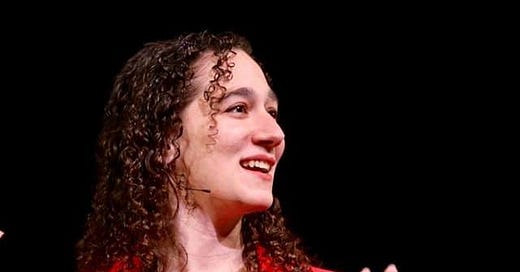I’ve fudged a little to be able to complete the thought. While Chana and I work on our dialogue about the curiosity of children, here are two good grafs from Lewis Hyde’s A Primer for Forgetting.
Myself, when writing poems, I practice revision by forgetting. I write a draft of the poem, and then another and another, allowing the versions to pile up in a jumble—lines I am attached to, although they don’t belong, lines that fit but go flat in the middle, words replaced and then reinserted, promising developments that never delivered—it all sits there, a shapeless pile, clammy with fatigue.
Then I set the mess aside and ignore it for at least one day. Then I write the poem from memory. Great chunks will have fallen into oblivion, while others will have returned clarified from the pool. The double goddess attends, erasing as she records, drawing shape from shapelessness, dropping the discord to reveal the harmony.
I’m a tremendous fan of Hyde. I drew on his Trickster Makes This World for a talk on Christus Victor at Doxacon (a Christian fantasy and scifi convention, happening online in November). And I drew on his writings on usury in The Gift: Imagination and the Erotic Life of Property when I spoke at the American Solidarity Party convention this summer.
His process for writing poetry is similar to what I did when writing my first book, Arriving at Amen. I printed out drafts of my chapters, took them to the library, and then retyped each one, trying to glance quickly at the papers on my lap and then type. I hoped this meant any too-complicated clauses would wind up smoothed out. Now, I edit by showing drafts to my husband, who writes “This could be two sentences” or sometimes three in the margin.
Elsewhere: As a follow-up to our first reading on “Contrapuntal Order,” there’s a good essay in Plough by Dhananjay Jagannathan on polyphonic singing and political philosophy.
What have you been reading?
Ex libris,
Leah




“Adelgeim grew ever more pessimistic, afraid that faith itself, even God, was becoming superfluous in the church’s quest for advantage in the here and now. He saw that church leaders were demanding ever-less spiritual effort from parishioners, that they had lost the voice of clarity and truth, and instead spoke in terms of rituals and obedience. Orthodoxy became the realm of formal keywords and symbolic gestures. Check this box, the implicit bargain held, and receive a guarantee of salvation and spiritual wholeness. But Adelgeim feared that the church’s true authority, that of Christian love and practice, was running empty—an emptiness masked, at least temporarily, by the church’s ascendance in public life. In an essay on the dangers of Patriarch Kirill’s ‘romance’ with the state’s imperial power, he warned of how ‘when the confession of faith is crowded out by ideology, when sovereigns cross themselves and lavish their imperial church with gifts, the Church becomes rich in wealth but impoverished in spirit. Secular and spiritual power are united by violence.“ — Joshua Yaffa, “Between Two Fires: Truth, Ambition, and Compromise in Putin’s Russia”
Two ways to make contemptible
the world: the first is not to look;
the second, and more sensible,
to read it like a book,
to learn the grammar and the word,
loving not the less but more,
contemning it as music heard
supersedes the score.
Poem by Dr. John Senior